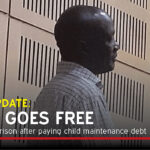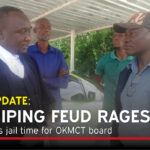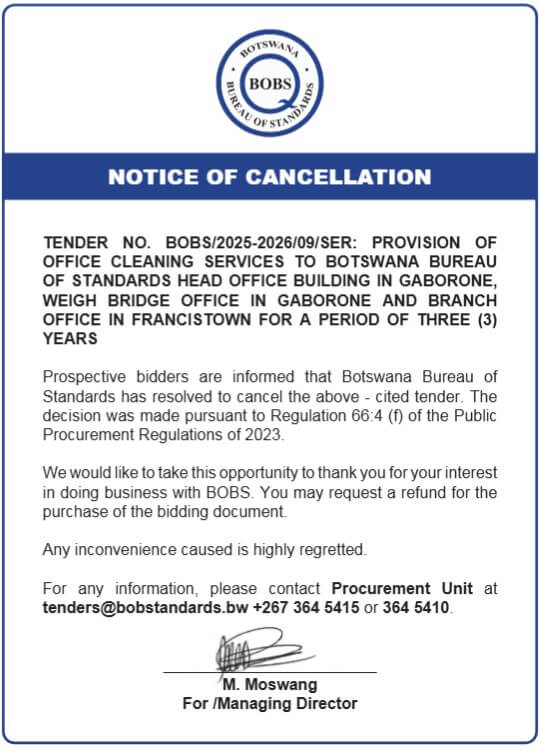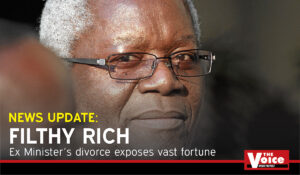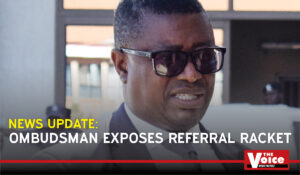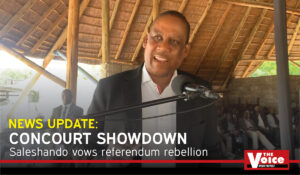Chobe Land board caught in a web of lies
The Francistown Land Tribunal has ruled in favor of Pandamatenga residents in a landmark case that will see 2500 hectares of farmland allocated to 266 households in Pandamatenga.
In a landmark ruling Land Tribunal President Bannister Mokakangwe ruled that it was unlawful for Chobe Land board to disregard an earlier agreement made as a condition to obtain a loan from the African Development Bank (AfDB).
The appellant Kgosi Rebecca Banika of Pandamatenga was challenging of the board for reserving four fields (458ha) for her community instead of 2500ha which was expected from the Pandamatenga Agricultural InfrastructuralDevelopment Project as a benefit to the locals.
In 1984 government allocated 25,074ha to farmers in Pandamatenga with an aim to boost cereal production, but due to a flooding problem, traversing the fields became impossible. Following a study, construction of water drainage works was recommended and the government requested AfDB to finance the project.
An additional 2500ha, which is today deeply contested was demarcated to make the total area affected 27,574ha.
Banika and her people contest that the 2500ha was intended to benefit 266 households existing in the Pandamatenga as at 2008, in the form of allocation of farmland, an assertion the land board denies.
This is despite evidence given by Martinus Kruger, a farmer in Pandamatenga since 1995, who was also part of the committee that sat in meetings with AfDB.
Kruger told court that it was agreed that AfDB would lend the government the money required on condition that 2500ha of the land affected by the project be reserved for the community.
Kruger further stated that contrary their claims, the land board was represented at the meetings with the AfDB officials.
His sentiments were shared by Kgosi Banika who said she found discussions about funding already on course when she was installed in 1999.
She after debushing, fencing the 2500ha and training residents on various farming techniques, while awaiting optimal allocation of land, they later learnt through the then Minister of Land Management Prince Maele, and Minister Kgotla Autlwetse that the plot had been downsized to 458ha.
This was further corroborated by Councillor Tengenyane Tuelo, who further revealed that in one of the meetings with AfDB officials former Chobe Land Board Chairman Nelson Masule was present.
“I specifically posed a question to Masule, as to how the local households would benefit from the project as they had no land there, and he could not readily answer,” said Tengenyane.
Chobe Land board on the other hand are adamant that there’s no undertaking recorded either by them or any other government entity to reserve 2500ha of land to the Pandamatenga locals to the exclusion of the rest of Batswana.
The land Board insists this would be unlawful, as it would run contrary to the procedure followed before any allocation in terms of the Tribal Land Act, Regulations and Policy.
Despite their stance, Project Coordinator Stanley Semetsa, who was subpoenaed by court also affirmed that indeed the 2500ha was reserved for the 266 households. He further stated that members of the community were trained in among other beekeeping, drainage, roads awareness, and soil conditions, and once the project was complete they handed over to the land authority to allocate accordingly.
In his ruling Mokakangwe said it was unlawful for the land board to renege from the undertaking without due cause, and ordered it to allocate the reserved 2500ha of land as originally intended. The appellants were represented by attorney Kagiso Jani.




